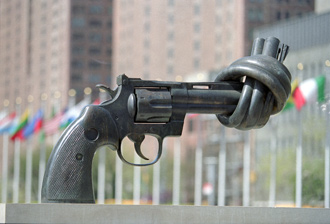Following the trail of the historical development of nonviolence takes us to wonderful expressions of the human spirit.
Starting from Akhenaton, Egyptian Pharaoh XIV century BC: “If you are industrious to produce wealth, be generous in the disposal of it. Man never is so happy as when he gives happiness unto another.”
To Silo in 1969: “Carry peace within you and carry it to others” and reaffirming the Golden Rule “When you treat others as you would have them treat you, you liberate yourself”, illuminating once again the root of Active nonviolence.
In between many famous and anonymous heroes and heroines of this truly intentional choice have been building this philosophy, this way of life, this coherent path towards a transcendental existence.
Inspiration comes in many shapes and sizes; here we have a fragment of the poet Percy Shelley’s Masque of Anarchy:
“Written on the occasion of the massacre carried out by the British Government at St Peter’s Field, Manchester 1819, Shelley begins his poem with the powerful images of the unjust forms of authority of his time “God, and King, and Law” – and he then imagines the stirrings of a radically new form of social action: “Let a great assembly be, of the fearless, of the free”. The crowd at this gathering is met by armed soldiers, but the protestors do not raise an arm against their assailants:
“Stand ye calm and resolute,
Like a forest close and mute,
With folded arms and looks which are
Weapons of unvanquished war.
And if then the tyrants dare,
Let them ride among you there,
Slash, and stab, and maim and hew,
What they like, that let them do.
With folded arms and steady eyes,
And little fear, and less surprise
Look upon them as they slay
Till their rage has died away
Then they will return with shame
To the place from which they came,
And the blood thus shed will speak
In hot blushes on their cheek.
Rise like Lions after slumber
In unvanquishable number,
Shake your chains to earth like dew
Which in sleep had fallen on you-
Ye are many — they are few”
Shelley elaborates on the psychological consequences of violence met with pacifism. The guilty soldiers he says, will return shamefully to society, where “blood thus shed will speak/In hot blushes on their cheek”. Women will point out the murderers on the streets, their former friends will shun them, and honourable soldiers will turn away from those responsible for the massacre, “ashamed of such base company”. A version was taken up by Henry David Thoreau in his essay Civil Disobedience, and later by Mohandas Karamchand Gandhi in his doctrine of Satyagraha. Gandhi’s passive resistance was influenced and inspired by Shelley’s nonviolence in protest and political action. It is known that Gandhi would often quote Shelley’s Masque of Anarchy to vast audiences during the campaign for a free India”. Wikipedia
Martin Luther King, Aung San Suu Kyi and so many others took the methodology to their struggle. Silo proposed Gandhi’s nonviolent Revolution not just for a particular conflict, but as the methodology and objective to transform both the system in which we live and the human being.
Today, as we contemplate with sadness the continuation of wars and violence, not just physical violence but also economic, religious, racial, psychological, ecological, sexual, moral, etc, we must remember that nobody is born violent, or nonviolent for that matter, and that creating a humanised world is our choice, every step of the way.






